Thursday is my favorite day of the week.
All day, I look forward to my evening class at a local seminary. I teach in Spanish to 12 hard working immigrants and we are looking at the first five books of the Bible. I sometimes post things for my students on this site.
We use Spanish in the class, but Spanish is a second language for nearly half of us.
Five of my students learned a Mayan language from their mothers. There are 30+ Mayan languages spoken in Guatemala and my students speak 5 of them. Spanish is our shared language. If you knew my mother, you know she taught me English
I have been running into more and more people from minority/original language communities of Latin America. Last week I went along with Jer Swigart of The Global Immersion Project when he took some friends from church to hear the stories of 5 immigrant day laborers near my home. For two of the five, Spanish is a second language. Their mothers taught them Quechua (Perú) and Chinanteco (México).

I find it surprising that so many indigenous language communities from all over the Americas are present here in the Bay Area. One of my students tells me that there are 10+ Mam-speaking churches just in Oakland. Mam is a Mayan language that is spoken in Guatemala (and Oakland, apparently).
I love that this opens the door to share life with them so close to home. My country will be richer because of them. When we lived in Guatemala, even though I was closer, I needed a four wheel drive truck so I could go to their villages. But I often came home with the back full of broccoli or strawberries, or both. Our home is graced with their artistry.
Minority language communities in the Americas have paid a high price to preserve their languages and cultures. Their commitment to their cultures preserves an important part of the human heritage. The places they live in are often isolated, marginalized, and suffer institutionalized violence. Despite the oppression, large portions of Mexico,Belize, Guatemala, Colombia, Ecuador, Perú, Bolivia and Paraguay hold onto languages and traditions from before Columbus came to America.
Columbus came to America.
When I meet them now as immigrants, they generally repeat two themes: First, that God is to be credited for making it possible for them to be here working. He protected them on their journey–sometimes carrying their kids all day across the desert. They credit him for each day’s work, and the strength to face incredible challenges.
The second theme is gratitude for the United States. This is where they have opportunities to work and accomplish their dreams. They have found education for themselves and for their kids. They are grateful they can provide a better future for their kids.
When I read the Bible with them it changes how I understand it. I never realized it before, but in the first five books of the Bible, God addresses himself only to migrants and slaves. And his purpose is not so much to settle them in the land and free them from slavery. He is aiming to entrust them with his mission to bless all of humanity. God doesn’t choose governments or people who are settled in. And immigrants are not portrayed as people to be reached. God chooses migrants and slaves to be the agents of His mission. They are the ones charged with giving God his reputation.
I will think of this next time I sing “God bless America.” God loves our country enough to keep bringing immigrants. He protects them even from our efforts to keep them out. He brings them here to bless us. To participate in that blessing, my students are taking time from their busy schedules to study the Bible. I just wonder why original peoples of the Americas—the people to whom we send Bible Translators, because they are targets of “our” mission—are so heavily represented in the immigrant population? In what way is God bringing blessing to humanity through them?
Even if my fellow Americans don’t feel blessed, and especially because I have no control over how God will use them as an expression of the new humanity, I love Thursday nights.

Powerful reflections, Tim, and thank you for your ministry to my compatriots (I was born in Guate and lived there 14 years; my parents for 47). I love that perspective that God speaks in the Pentateuch to migrants and slaves! It’s interesting to me how God addresses His people differently when they are the oppressed v when they become oppressors! Love to you and Lois.
LikeLike
I too appreciate the insight from the first five books of the Bible about God’s view of migrants and slaves and people who have something to give rather than being the destitute who need to receive only.
It is also beautiful to see your love for the Latin immigrants in your community. It awakens in me also a warmth in my heart toward them. Thanks.
LikeLike